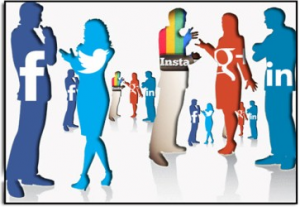
Source: www.monitis.com
Social media has essentially been turned into a highlight reel of the lives its users. But does the “end of life” truly mean the end of posts?
According to We Are Social’s Digital Report 2018, the world houses 3.196 billion social media users. With the rise of online interaction, your profiles (typically spanning multiple platforms) and your internet activity contribute to your online identity. Your digital footprint, defined by TechTerms as the “trail of data you create while using the Internet,” increases with every click and search you make on the web. This accumulation of data creates a new aspect of your personhood, otherwise known as your “digital life.” The extension of the self to an outside source prompts an important question: Will your personhood exceed death due to the existence of your online persona?
Behind every online profile is the assumption of a live person on the other end. However, when a user dies, what happens to their accounts? It is not uncommon to visit the page of a recently deceased user and see their profile flooded with comments of “#RIP,” emojis of broken hearts, and the intriguing phrase “You will be missed.” The “you” implies that despite the decease of the user, their personhood is still in existence. Because of the existence of their profile and the ability for interaction with it to still occur, it is as if the person is not entirely gone.
In “Posthumous personhood and the affordances of social media” by James Meese, Bjorn Nansen, Tamara Kohn, Michael Arnold and Martin Gibbs, the authors explore this idea of the digital life exceeding the biological life. They discuss how the development of services such as DeadSocial allow the deceased to control their social media posthumously. Through this site, people can write messages and schedule their release for after their death. The ability to send to communicate after passing on blurs the line of constrained interaction between the dead and the living. While your body may have stopped functioning, your digital life continues on.
Additionally, the authors explore the ability of loved ones to take over the accounts of relatives they have lost. Despite being operated by another person, the identity of the account still belongs to the deceased. Meese and his co-authors give the example of Greg Murphy, whose wife, Natalie, was a victim of cancer Following her death, he took over her Facebook profile to continue her work in breast cancer prevention advocacy. Through using her profile to uphold her beliefs, Greg is able to keep not only her memory, but her personhood alive. Natalie’s Facebook friends still see “her” interacting with them online, almost as if she is still there.
There, of course, are disputes about who has the right to control the digital lives of the deceased. While some argue access should be granted to friends and family, others believe that the privacy of the individual should be respected. As the issue becomes more prevalent, new features such as “Memorialization” on Instagram and “Legacy Contacts” on Facebook allow the profiles to outlive the user. However, the practice of keeping accounts active prolongs the digital life in a way that biology cannot.
This leaves a question to ponder: is social media really only for the living?
Works Cited
“Death and the Internet.” Wikipedia, Wikimedia Foundation, 22 Oct. 2018, en.wikipedia.org/wiki/Death_and_the_Internet.
“Digital Footprint.” Digital Footprint Definition, techterms.com/definition/digital_footprint.
“Digital in 2018: World’s Internet Users Pass the 4 Billion Mark.” We Are Social UK, 30 Jan. 2018, wearesocial.com/uk/blog/2018/01/global-digital-report-2018.
Facebook Help Center. What Is a Legacy Contact and What Can They Do?, www.facebook.com/help/1568013990080948.
Instagram Help Center. What Happens When a Deceased Person’s Account Is Memorialized?, 2018, help.instagram.com/231764660354188.
Meese, James, et al. “Posthumous Personhood and the Affordances of Digital Media.”Mortality, vol. 20, no. 4, 2015, pp. 408-420.
User, Super. “DeadSocial – Digital Legacy Management.” DeadSocial – Prepare for Death Digitally & Build Your Digital Legacy – DeadSocial – Digital Legacy Management, deadsocial.org/.